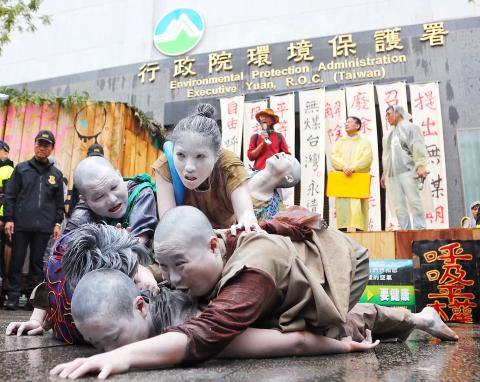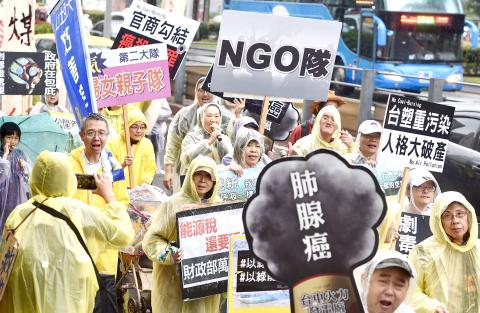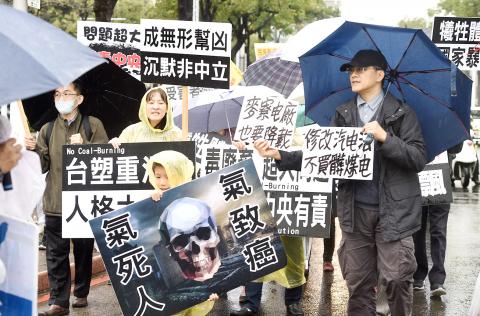Environmental groups joined forces and braved the rain in Taipei yesterday to march against air pollution and call for measures against it.
The march was co-organized by more than a dozen groups, including Air Clean Taiwan (ACT), South Taiwan Air Clear, the National Federation of Teachers’ Unions, the Alliance for the Rescue of Datan Algae Reefs, the Taiwan Academy of Ecology and the Taiwan Tree Protection Coalition.
Several political parties were also represented at the march, including the New Power Party, the New Party and the Taiwan People’s Party.

Photo: CNA
At about noon, demonstrators gathered outside the Environmental Protection Administration building, where the vice presidential candidates of the Democratic Progressive Party (DPP) and the Chinese Nationalist Party (KMT) spoke to them before the march began.
The DPP’s candidate, former premier William Lai (賴清德), said that during his premiership from September 2017 to January the Executive Yuan’s National Council for Sustainable Development released the nation’s first Voluntary National Review.
He mentioned a number of proposals, including closer collaboration between the council and private groups and businesses; a reassessment of the Greenhouse Gas Reduction and Management Act (溫室氣體減量及管理法); and the development of a timetable for carbon neutrality in Taiwan, for the future.

Photo: Peter Lo, Taipei Times
However, some demonstrators demanded “promises” instead of “empty words” as Lai left the scene.
Shortly after Lai’s departure, the KMT’s vice presidential candidate, former premier Simon Chang (張善政), who served during former president Ma Ying-jeou’s (馬英九) second term, spoke to the crowd.
Chang claimed that former Academia Sinica president Lee Yuan-tseh (李遠哲) quoted President Tsai Ing-wen (蔡英文) as saying that “solving [the problem of] air pollution is the next generation’s business.”

Photo: Peter Lo, Taipei Times
Chang said “we 1,000 percent disagree.”
Chang said his campaign’s energy policy is to “carry out the results of last year’s two referendums.”
“One is to reduce coal-fired power generation each year, and the second is to ‘use nuclear to support green,’” he said. “We also support green energy, but we do not support an impetuous [shift to] green energy.”
However, Chang’s mention of “using nuclear to support green” appeared to upset some demonstrators, who interrupted him by saying they wanted a “nuclear-free homeland.”
After a series of scheduled speeches by group representatives, the demonstrators at about 1:30pm began their march toward Liberty Square, arriving at about 3pm.
They shouted slogans such as “The greater south wants health," “Breathing needs equal rights,” and “Coal-free Taiwan, sustainable health” as they marched.
They also held signs that read, “Nuclear-free, coal-free homeland,” and “Legalized harm, state violence,” among other messages.
For the march, ACT listed four major demands, including the hosting of a “climate conference” and the abolition of the “centralization of energy.”

MAKING WAVES: China’s maritime militia could become a nontraditional threat in war, clogging up shipping lanes to prevent US or Japanese intervention, a report said About 1,900 Chinese ships flying flags of convenience and fishing vessels that participated in China’s military exercises around Taiwan last month and in January have been listed for monitoring, Coast Guard Administration (CGA) Deputy Director-General Hsieh Ching-chin (謝慶欽) said yesterday. Following amendments to the Commercial Port Act (商港法) and the Law of Ships (船舶法) last month, the CGA can designate possible berthing areas or deny ports of call for vessels suspected of loitering around areas where undersea cables can be accessed, Oceans Affairs Council Minister Kuan Bi-ling (管碧玲) said. The list of suspected ships, originally 300, had risen to about 1,900 as

Japan’s strategic alliance with the US would collapse if Tokyo were to turn away from a conflict in Taiwan, Japanese Prime Minister Sanae Takaichi said yesterday, but distanced herself from previous comments that suggested a possible military response in such an event. Takaichi expressed her latest views on a nationally broadcast TV program late on Monday, where an opposition party leader criticized her for igniting tensions with China with the earlier remarks. Ties between Japan and China have sunk to the worst level in years after Takaichi said in November that a hypothetical Chinese attack on Taiwan could bring about a Japanese

MORE RESPONSIBILITY: Draftees would be expected to fight alongside professional soldiers, likely requiring the transformation of some training brigades into combat units The armed forces are to start incorporating new conscripts into combined arms brigades this year to enhance combat readiness, the Executive Yuan’s latest policy report said. The new policy would affect Taiwanese men entering the military for their compulsory service, which was extended to one year under reforms by then-president Tsai Ing-wen (蔡英文) in 2022. The conscripts would be trained to operate machine guns, uncrewed aerial vehicles, anti-tank guided missile launchers and Stinger air defense systems, the report said, adding that the basic training would be lengthened to eight weeks. After basic training, conscripts would be sorted into infantry battalions that would take

DEEP-STRIKE CAPABILITY: The scenario simulated a PLA drill that turned into an assault on Taiwan’s critical infrastructure, with the launchers providing fire support Taiwan yesterday conducted this year’s first military exercises at Longsiang Base in Taichung, demonstrating the newly acquired High Mobility Artillery Rocket System’s (HIMARS) ability to provide fire support and deep-strike capabilities. The scenario simulated an attack on Penghu County, with HIMARS trucks immediately rolling into designated launch areas and firing barrages at the Wangan (望安) and Cimei (七美) islands, simulating the provision of fire support against invading forces. The HIMARS are supposed to “fire and leave,” which would significantly increase personnel and equipment survivability, a military official said. The drill simulated an exercise launched by the Chinese People’s Liberation Army (PLA) Eastern